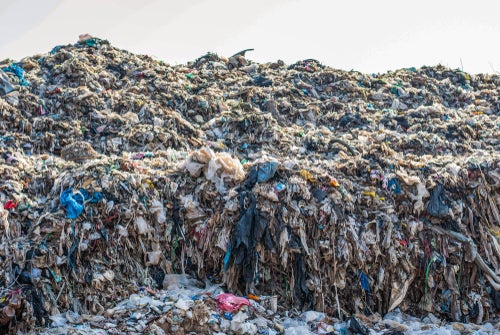
The UK Government says its Waste Prevention Programme for England, known as ‘Maximising Resources, Minimising Waste,’ aims to support its waste reduction targets and net zero commitment.
The UK Government explains it plans to focus on seven key sectors, which include textiles and plastics/packaging as well as construction furniture, electronics, food and road vehicles.
The Waste Prevention Programme aims to reduce fashion and textiles going to residual waste, increase product utilisation, and stimulate a profitable textile recycling industry, all while promoting a circular economy.
The report explains the fashion and textiles industry is known for its high resource intensity and environmental impact, which poses considerable challenges to sustainability efforts.
To address these issues, the Waste Prevention Programme focuses on circular business models such as resale, rental, and repair, as well as investing in textile reprocessing and recycling in line with the waste hierarchy.
The goal is to keep products and materials in circulation for as long as possible to reduce greenhouse gas emissions, pollution, and waste across the lifecycle from production to end-of-life.

US Tariffs are shifting - will you react or anticipate?
Don’t let policy changes catch you off guard. Stay proactive with real-time data and expert analysis.
By GlobalDataThe report highlights a significant amount of textiles waste is generated, with over one million tonnes of textiles estimated to be disposed of in household and commercial municipal residual waste in England alone.
To combat this, the government has committed to near-eliminating municipal biodegradable waste to landfills from 2028 and halving residual waste (excluding major mineral wastes) kg per person by 2042, as set out in the Environment Act 2021.
UK Government works with fashion industry to make plan a reality
Recognising the need for a collective effort, the government has partnered with the fashion industry to drive voluntary action through initiatives like Textiles 2030, the UK Sustainable Textile Action Plan. Signatories of the plan commit to ambitious 2030 targets, including a 50% reduction in the carbon footprint of new products and a 30% reduction in water footprint. Circular business models and closing the loop on materials are among the key focus areas to achieve these targets.
To further deploy the Waste Prevention Programme and guide businesses managing textiles and fashion products, the government will develop a textiles waste hierarchy, offering robust guidance. Measures such as requiring businesses to provide customer take-back systems for used textiles and banning separately collected materials from being sent to landfill and energy-from-waste without prior sorting will be explored.
To enhance voluntary action in reducing textiles waste, the government will continue to fund Textiles 2030, seeking to expand the programme’s scope to tackle overproduction and waste. Standardised measurement and reporting of waste generation across the supply chain, with a focus on unsold and surplus stock, will also be encouraged.
The report highlights innovation and research are key drivers in achieving a circular fashion and textiles sector. As a result the UK Government has funded the Interdisciplinary Textiles Circularity Centre, a research programme aimed at developing renewable textile materials from post-consumer textiles and household waste.
Additionally, through the UK Research and Innovation’s Circular Fashion Programme, the government will fund £15m ($19m) to address challenges in adopting circular business models. This includes £4m for a sorting and recycling demonstrator, £6m for research, £2m for an industry-led Innovation Network, and £3m for projects partnering UK fashion companies with universities.



